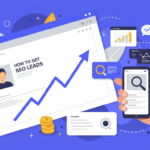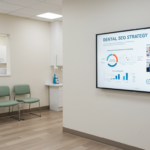Why is Digital Marketing Important?
In today’s fast-paced, internet-driven world, having a digital presence isn’t just a nice-to-have; it’s essential. Whether you’re running a small business or a multinational company, digital marketing plays a critical role in how you reach and engage with your customers. But what makes digital marketing so important? Let’s dive into the reasons why businesses of all sizes should be embracing digital marketing.
Reach a Wider Audience
Traditional marketing methods like print ads or TV commercials can only take you so far. With digital marketing, you can reach people around the world with just a few clicks. Whether your audience is local or global, digital marketing allows you to connect with them where they are—online.
For instance, if you’re a local café, you can target nearby residents through social media ads or Google My Business listings. If you sell products online, you can tap into customers from different countries through SEO and paid ads. The internet has no borders, and digital marketing helps you leverage that global reach.
Cost-Effective Marketing Solution
One of the biggest advantages of digital marketing is its cost-effectiveness. Unlike traditional methods such as billboards or TV ads, digital marketing allows you to start small and grow your budget as you see results. Even a limited budget can deliver a strong return on investment (ROI) if you use the right strategies.
For example, you can run a social media ad for as little as a few pounds a day and reach hundreds of potential customers. Similarly, SEO efforts like optimising your website or creating valuable content cost less upfront but can deliver long-term, sustainable traffic to your site.
Target Specific Audiences
Gone are the days of one-size-fits-all marketing. Digital marketing allows you to tailor your message to specific groups of people, ensuring you reach the right audience at the right time. With tools like Facebook Ads, Google Ads, and email marketing platforms, you can segment your audience by demographics, interests, behaviours, and even past interactions with your business.
This level of targeting means you’re not wasting money advertising to people who are unlikely to be interested in your product or service. Instead, you’re delivering relevant, personalised content to those who are most likely to engage with your brand.
Measurable Results in Real-Time
One of the most frustrating things about traditional marketing is the difficulty in tracking its effectiveness. How do you know if that billboard increased sales or if that newspaper ad reached the right audience? With digital marketing, you don’t have to guess.
Digital marketing provides real-time data and analytics. Tools like Google Analytics, Facebook Insights, and email marketing platforms allow you to track metrics such as website traffic, conversion rates, click-through rates, and engagement. This data helps you make informed decisions about what’s working and what’s not, allowing you to tweak your campaigns for better results.
Builds Brand Awareness and Trust
Your online presence is often the first impression a potential customer will have of your business. A well-executed digital marketing strategy helps you build brand awareness, establish trust, and create meaningful connections with your audience.
Content marketing, for example, allows you to provide valuable information that answers your audience’s questions, helping to position your business as an authority in your field. Over time, this builds trust, and when customers trust your brand, they’re more likely to do business with you.
Additionally, social proof—like reviews, testimonials, and case studies—boosts credibility. People trust the opinions of others, so showcasing positive reviews and client success stories can make your brand more appealing to potential customers.
Engages Customers Throughout the Buying Journey
The customer journey isn’t linear, and digital marketing helps you engage with your audience at every stage—from awareness to consideration to purchase and beyond. Through digital channels like social media, email marketing, and retargeting ads, you can stay top-of-mind with your audience, nudging them toward conversion when they’re ready.
For example, a potential customer might first come across your business through a Google search (thanks to SEO). They might then follow you on Instagram or Facebook, engage with your posts, and eventually make a purchase after seeing one of your retargeting ads.
But it doesn’t stop there. Through email marketing, you can continue to engage with your customers after the sale, keeping them informed about new products, offering exclusive deals, and building long-term loyalty.
Provides Flexibility and Adaptability
Digital marketing allows you to adapt quickly to changing circumstances. Whether it’s a new trend, an updated algorithm, or feedback from your customers, digital campaigns can be adjusted in real time.
For instance, if you notice that a particular social media ad isn’t performing well, you can pause or modify it without wasting money. Similarly, if a certain blog post or email is getting lots of engagement, you can repurpose that content for other platforms or create similar content to capitalise on its success.
Levels the Playing Field for Small Businesses
In the past, larger companies with massive advertising budgets often had the upper hand in marketing. However, digital marketing levels the playing field, allowing small businesses to compete with the giants.
Even with limited resources, small businesses can build a strong online presence through effective digital strategies. Whether it’s through social media engagement, local SEO, or content marketing, small businesses can carve out their niche and connect with their audience without breaking the bank.
Encourages Engagement and Interaction
Digital marketing isn’t just about broadcasting your message to the world; it’s also about fostering two-way communication. Social media platforms, in particular, offer the perfect environment for businesses to engage with their audience directly.
By responding to comments, sharing user-generated content, and participating in conversations, businesses can build stronger relationships with their customers. This engagement also humanises your brand, making it more relatable and approachable.
Helps You Stay Competitive
In today’s market, most businesses are already using digital marketing to some extent. If you’re not, you risk being left behind. Your competitors are already engaging with potential customers online, and if you’re not part of that conversation, you could lose out on valuable opportunities.
By keeping up with digital marketing trends, you can stay ahead of your competition and ensure your business remains relevant in a crowded marketplace.
Conclusion
Digital marketing is essential for any business looking to thrive in the modern world. Its ability to reach a global audience, provide real-time data, and target specific customer segments makes it one of the most effective marketing tools available. Whether you’re a small business or a large corporation, embracing digital marketing will not only help you grow your brand but also stay competitive in an increasingly digital landscape.
By investing time and effort into your digital marketing strategy, you’re setting your business up for long-term success, building relationships with customers, and opening up new opportunities to expand your reach.
FAQs
Absolutely! Digital marketing is highly adaptable and can be tailored to suit any budget, making it perfect for small businesses looking to build a presence online.
It depends on the strategy. While PPC ads may deliver results instantly, SEO and content marketing can take a few months to start showing significant growth. Patience is key!
It depends on your audience and business goals. Social media is great for building engagement, while SEO and PPC are perfect for driving traffic. Email marketing is ideal for nurturing relationships.
Yes, a website is often the hub of your online presence. It acts as a landing point for your audience and is crucial for SEO, content marketing, and driving conversions.
Use analytics tools like Google Analytics or social media insights to track metrics such as website traffic, engagement, and conversion rates. These will help you measure the effectiveness of your efforts.









